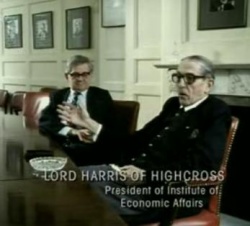Ralph Harris
"I am very critical of democracy. Politics has meant unlimited democracy and unlimited claims on the national income." - Ralph Harris [1]

Ralph Harris, Lord Harris of High Cross (born 10 December 1924 - 19 October 2006), who described himself as a 'radical reactionary', [2] was a founder of the seminal neoliberal think-tank the Institute of Economic Affairs (IEA). He was General Director of IEA from 1957 to 1987.[3]
Biography
Harris was born on 10 December 1924. He attended Tottenham Grammar School and Queens’ College, Cambridge. He was a Lecturer in Political Economy at the University of St. Andrews from 1949 to 1956 during which time he twice stood as a Conservative MP, first in 1951 in the constituency of Kirkcaldy, and then in Edinburgh Central in 1955. He was not elected.
In 1956 he joined the Glasgow Herald as its Leader-writer and a year later was appointed director of the Institute of Economic Affairs. From 1980 to 1995 he was a Council Member at the University of Buckingham – Britain’s only private university which was closely affiliated with the IEA - and was a Director of Murdoch's Times Newspapers Holdings Ltd from 1988-2001. [4]
Views
In his obituary the Guardian described Harris as having been, 'the high priest of the libertarian right, whose creed included full-blooded monetarism, the unleashing of market forces, sharp tax cuts, unrestricted Sunday trading, the castration of trade unions and the abolition of minimum wages, nationalised industries and inflation-proof pensions.' [5]
Free to Choose
In his autobiography the neoliberal fundamentalist Milton Friedman notes the role that Harris played in finding a television production team for his 1980 neoliberal polemical Free to Choose:
[We] felt that it was essential that the producer have his heart and not merely his technical skills in the project. In an effort to find such a producer, I called my friend Ralph Harris, the director and one of the founders of the Institute of Economic Affairs, the pre-eminent free-market think tank in Britain. He suggested several possible names and promised to explore these and other possibilities.
Bob had been planning a trip to London to talk to the BBC about its interest in acquiring the program when it was completed and to talk with possible producers. The extra stimulus from Ralph’s encouraging reaction led Bob to take off for London on August 10… By far the most important interview was with Antony Jay, recommended by Ralph Harris as “a Friedman fan” (initially from reading my Playboy interview). Jay was a partner in Video Arts, a television production company formed by ex-BBC employees who had wanted to escape bureaucracy… [Later] Bob and I took off on September 20 for London, where we had extensive discussions with Antony Jay and two of his partners who were to be the most closely involved in the production of Free to Choose, Michael Peacock, managing director and Robert Reid, chairman. In addition, Peacock arranged for us to interview Michael Latham as a potential producer. Unlike the producers we had interviewed in the United States, both the Video Arts trio and Michael Latham were sympathetic to our philosophy and enthusiastic about producing a documentary to present it. [6]
Affiliations
Milton Friedman, friend
Mont Pelerin Society, member [7]
Notes
- ↑ Quoted in Andrew Roth, 'Lord Harris of High Cross: Rightwing economist with a radical agenda', Guardian, 20 October 2006
- ↑ Quoted in Andrew Roth, 'Lord Harris of High Cross: Rightwing economist with a radical agenda', Guardian, 20 October 2006
- ↑ ‘HARRIS OF HIGH CROSS’, Who Was Who, A & C Black, 2007; online edn, Oxford University Press, Dec 2007 [Accessed 9 Oct 2009]
- ↑ ‘HARRIS OF HIGH CROSS’, Who Was Who, A & C Black, 2007; online edn, Oxford University Press, Dec 2007 [Accessed 9 Oct 2009]
- ↑ Andrew Roth, 'Lord Harris of High Cross: Rightwing economist with a radical agenda', Guardian, 20 October 2006
- ↑ Rose D. Friedman, Two Lucky People: Memoirs (University of Chicago Press, 1999) p.475-6
- ↑ ‘HARRIS OF HIGH CROSS’, Who Was Who, A & C Black, 2007; online edn, Oxford University Press, Dec 2007 [Accessed 9 Oct 2009]